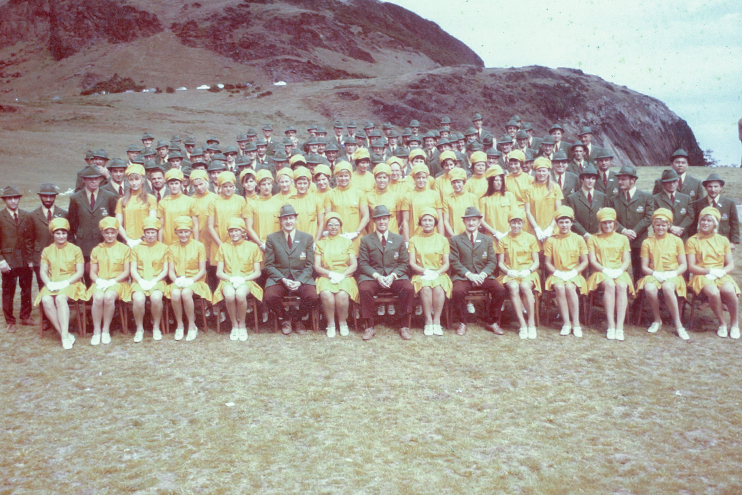
Australia regained its place as the dominant nation in the Commonwealth with a string of stirring performances at the Edinburgh Games of 1970.
Australia topped the medal tally with 82 medals from their 107 athletes, including 36 gold, 24 silver and 22 bronze medals.
England won more medals (84), but less gold (27) despite having 90 more athletes in their team to finish second in the medal table, with Canada collecting 66 medals and 18 gold in third.
Sending our second largest team to an away Games – with 107 athletes and 26 officials making up the 133-strong touring party to contest the 10 sports – athletics, badminton, bowls, boxing, cycling, fencing, swimming and diving, weightlifting and wrestling. Thirty-two members of the team were women, who competed in athletics, badminton, fencing (for the final time at the Games), swimming and diving.
The next challenge was how to send a 133-strong touring party, which proved to be an expensive team to send as well, with a Qantas 707 airplane chartered at a cost of $98,000 ($1.2m in 2020 dollars) to ferry the team from Sydney to Prestwick airport in Glasgow, via Singapore and Tehran.
Fundraising was a challenge. In an attempt to raise the money, a circus matinee was staged at Sydney Showground. For $1 each, the audience received a three hour non-stop show by Ashton’s and a Swiss aerial circus. In Victoria, three of Australia’s leading athletes — teachers Pam Kilborn, Peter Norman and Greg Lewis — had second thoughts about competing in the Games because the Victorian Education Department threatened to dock them a couple of weeks’ wages.
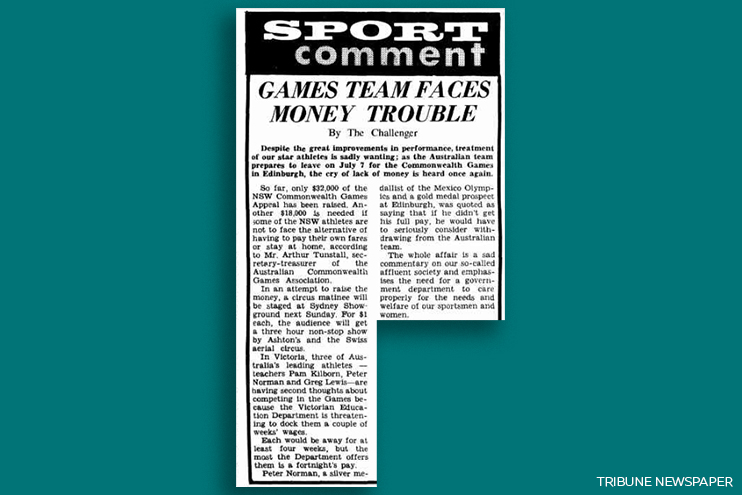
The funding was resolved and fittingly given the destination, the team left to the strains of the NSW Police Pipe Band and were greeted by local bagpipers on arrival.
On arrival in the village, which was in the shadows of the famous Arthurs Seat and adjacent to the Royal Commonwealth Pool, athletes received a sprig of white heather as a symbol of good luck and a welcome gift bag, the first of its kind, which included competitor handbooks and tourist information, but also soap, toothpaste, shoelaces, a first aid kit, Tartan scarves for women and ties for men, shortbread and Edinburgh Rock. Whiskey was also included but was held with team managers until after the Games were over.
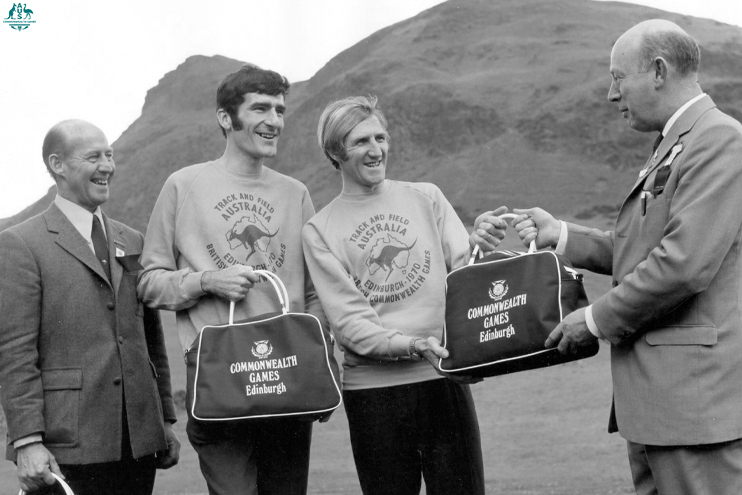
Derek Clayton and Noel Freeman being handed their team bags for the Edinburgh Games. (CGA Archive)
Held from the 16th-25th July 1970, the IX British Empire Games were a ‘Games of Firsts’, not the least of which was the selection of hurdler Pam Kilborn as Australia’s opening ceremony flagbearer. This was the first time at an Olympics or Commonwealth Games that Australia had a female opening ceremony flagbearer in what was still a male dominated world in sport.
Competing in her third Games, Kilborn had won the 80m hurdles at the Perth 1962 Games and Kingston 1966 Games, as well as winning silver behind Maureen Caird at the Mexico 1968 Olympics. Team Commandant and General Manager Arthur Tunstall remarked in his Games report, “She has been a wonderful athlete, spokeswoman and ambassador for her country.”
Kilborn remembering the moment said when summoned to team headquarters she thought she was in some trouble.
“The manager, Arthur Tunstall, came to me at dinner one night and said he wished to speak to me after dinner at headquarters as this was a very serious matter. I was shaking by the time I went across to headquarters. I could not think of anything I had done wrong.
“At the meeting, he told me I had been selected to carry the flag. I was to be at headquarters at 6.00 am next morning in full Australian uniform and to not tell a sole.
“This was not so easy as we were in a room of six girls. The women’s manager, Massie McQuiston, was awake for a meeting and must have known why I was also awake. It was formally announced with lots of photos by the press.
“I began to realise that this was a really big honour. I was to lead the whole Australian team onto the ground. There seemed to be far more people worthier than me to carry the flag.”
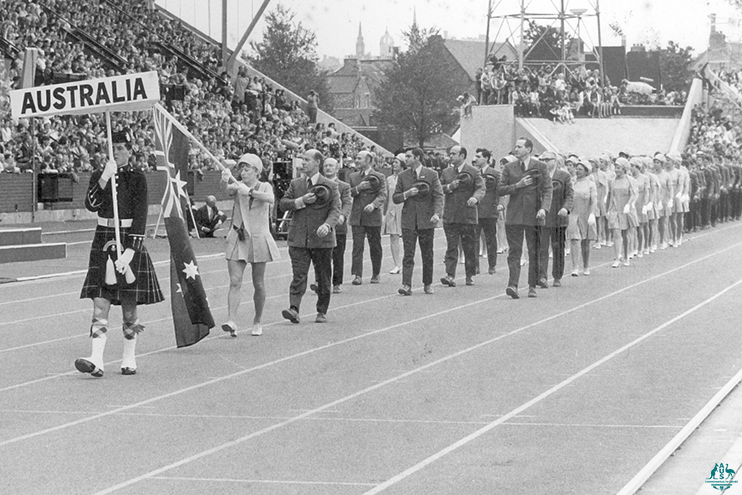
Pam Kilborn leading out the Australian team at the Edinburgh 1970 opening ceremony. (CGA Archive)
Australia’s historic flagbearer appointment was one of many firsts in Edinburgh, including:
- A Change of name for the Games, with the word ‘Empire’ a fixture of the Games since the first British Empire Games in Sydney in 1938, removed from the title and so the event was known as the British Commonwealth Games.
- The first Commonwealth Games to be broadcast in colour to the United Kingdom
- The first time a Games-specific logo was developed, and the first a Games mascot was used, a kilted Haggis called Wee Mannie, but was rarely seen throughout the Games!
- The first metric Games, with all distances measured in metres and centimetres and races no longer conducted in yards, so the 100 yards became the 100m and the mile the 1500m.
- The first Commonwealth Games to use an all-weather, rubberised athletics track
- Men and women shared the same Games village for the first time
What did not change was the political unrest at the time, with a boycott of 14 nations from Africa, Asia and the Caribbean threatened until the very last moment due to the continued refusal of South Africa to select anything other than an all-white cricket team. A tour of England by South Africa was cancelled at the eleventh hour.
1383 athletes from 42 nations, the most in Games history, arrived to participate in the Games. In the end, 27 won medals, at the time the most diverse medal spread in Games history.
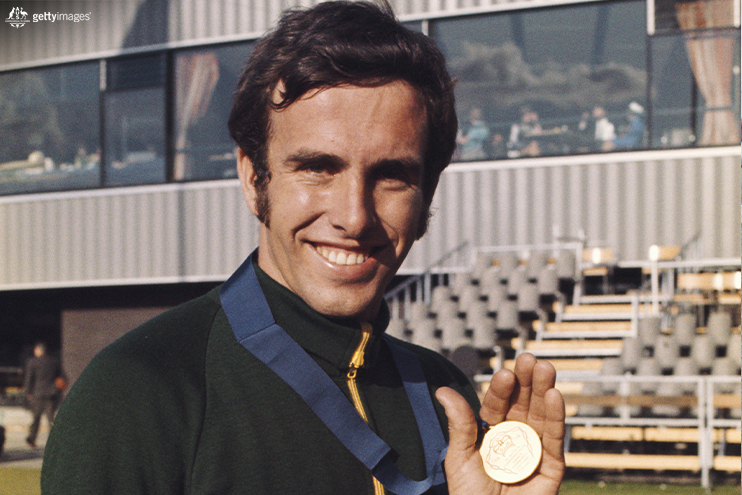
Geoff Smith won gold in the Men’s Decathlon. (CGA Archive)
Australian Team Highlights
After the best Olympic performance on record at the 1968 Games in Mexico, many of the stars of the pool and the track returned for the Edinburgh Games, including Australia’s two Olympic athletics gold medallists, hurdler Maureen Caird and 800m runner Ralph Doubell.
In the pool dual Mexico gold medallist Michael Wenden was a headline act in Edinburgh, and then emerging stars Raelene Boyle (athletics) and Karen Moras (swimming) who after both won medals in Mexico, would go on to make their marks on the Commonwealth Games.
Athletics team members won 10 gold medals, weightlifting four and cycling and diving two gold medals each. But it was at the newly-constructed Royal Commonwealth Pool, where Australian swimmers dominated the pool winning 18 gold medals, with the women leading the way winning gold in 12 of the 14 events.
16 year-old Karen Moras was the star, taking three gold medals over 200m, 400m and the 800m freestyle, breaking her own world record in the 800m.
Denise Langford won five medals, with four gold. She collected gold medals in the 200m and 400m individual medley, the 4x100m freestyle and medley relays and silver in the 400m freestyle. Langford’s daughter Kimberlee Green would go on to win the gold medal representing Australia in netball at the Glasgow 2014 Commonwealth Games.
Lynne Watson also won four gold and Beverley Whitfield won three. Hailing from Western Australia, Watson claimed the 100m and 200m backstroke double and was a member on the 4x100m freestyle and medley relay gold medal winning teams, Wollongong’s Whitfield claimed the 100 and 200m breaststroke golds along with the 4x100m medley. Maree Robinson won the 200m butterfly.
Australia’s men won all four of the men’s freestyle events and the 4x100m and 4x200m relays, the later in a world record from Graham White, Greg Rogers, Bill Devenish and Michael Wenden. It was Wenden’s fourth gold after already claiming the 100m and 200m freestyle crowns and being a part of the winning 4x100m freestyle team. White won the 200m freestyle and Graham Windeatt the 1500m free in a Games record.
At Meadowbank Stadium a star-studded Australian athletics team included Olympic champions, world record holders and emerging stars.
Pam Kilborn closed her Commonwealth career in her third Games by winning her third consecutive sprint hurdles titles, his time over 100m, to become the first woman to achieve the feat of winning the same event at three consecutive Games. Olympic champion Maureen Caird suffered with illness and whilst not at her best, still won the silver medal, in the reverse of the Olympic placings from Mexico two years earlier.
Kilborn was also a part of the winning 4x100m relay in Games record time alongside Raelene Boyle, Jenny Lamy and Marion Hoffman. It was Kilborn’s sixth gold medal in an extraordinary career which also included a title in the long jump in Perth.
Raelene Boyle won the sprint double, taking the 100m and 200m and then joined the relay for a third gold. It was a feat Boyle would repeat in Christchurch in 1974.
It was also the final Games for Ron Clarke, whose decorated career including lighting the flame at the opening of the Melbourne Olympic Games in 1956. After the heartbreak of the Mexico Olympics, Clarke went into the 10,000m as the favourite but was chased down in the final 100 metres by Scotland’s Lachie Stewart. Clarke won the silver, his fourth second placing from his three appearances in the Commonwealth Games. Clarke also finished 5th in the 5,000m, won by another Scott named Stewart, this time Ian. Clarke retired just weeks after the Games concluded.
There was a shock in the steeplechase, with South Australian Kerry O’Brien, who set a world record in 19 days before the Games, falling at the final water jump allowing teammate Tony Manning to take the gold medal ahead of two Kenyans. Aside from their boycott of the 1986 Games, also in Edinburgh, it would be the last time anyone would beat the Kenyans in the event at the Games. For Manning, who travelled a six-hour round trip from his home in Coolah, NSW to train in Sydney for the Games, his dedication was rewarded.
In other highlights, high jumper Lawrie Peckham won his second consecutive title and became the first Australian to clear seven feet (2.14m). Geoff Smith won the decathlon by just two points, Noel Freeman and Bob Gardiner finished first and second in the wall, and Phil May won the triple jump in a Games record and finished second in the long jump. Victorian Petra Rivers won the women’s javelin title.
Diver Don Wagstaff won both the 3m Springboard and Platform diving gold and at the velodrome, adjacent to the athletics stadium, where the tandem sprint made its Games debut and Gordon Johnson and Ronald Jonker claimed the gold medal. Johnson, who raced at the 1964 and 1968 Olympics, as his father had done in 1936, turned professional the week after the Games and went on to win the world sprint title. His teammate John Nicolson defeated Jonker in the sprint event in Edinburgh.
For our weightlifters, it was a breakout Games. Four gold medals George Vasil (flyweight), Russell Pery (middleweight) and Nicolo Cianco (light-heavyweight) all set Games records to win gold. Ray Rigby defied the pain of planta fasciitis caused by walking the wards in his job as a nurse, to win the super heavyweight division. Rigby competed in the shot put in Christchurch four years later to be one of only five athletes who have competed at the Games in more than one sport.
Vasil took up weightlifting at the encouragement of one of his school teachers, Gary Knoke, who ended up as his teammate at the 1970 Games running the 400m hurdles.


